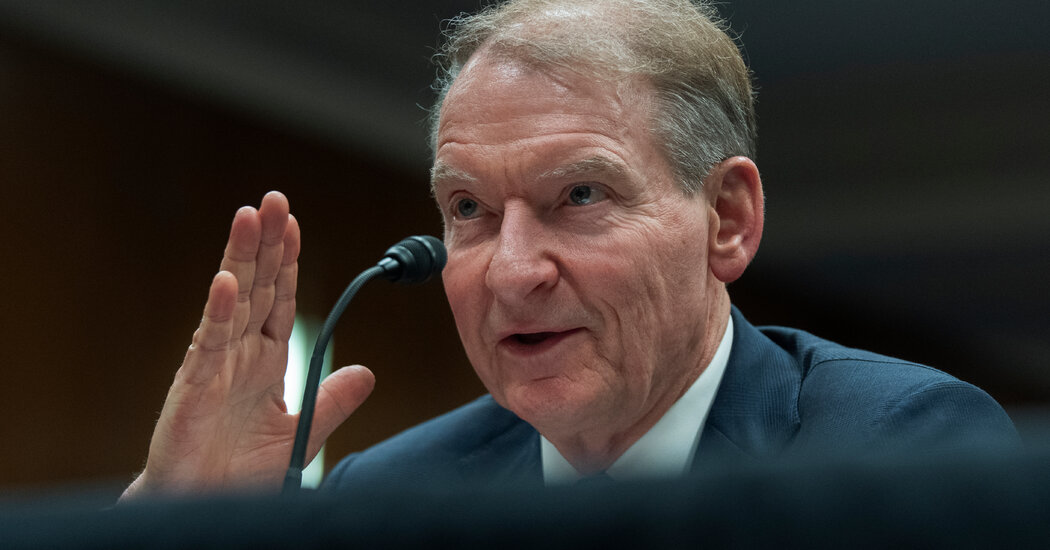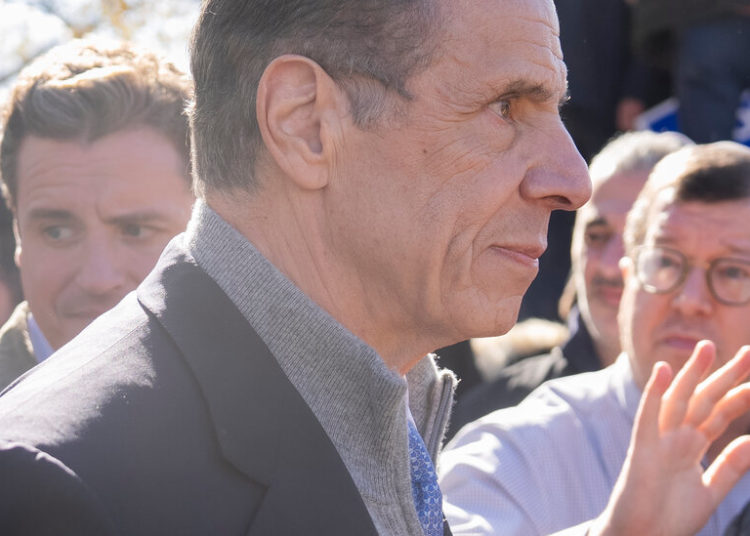“You want to stay private as long as possible,” Edwin Chen, the founder of Surge AI, recently told DealBook. His company, he said, has about a billion dollars in annual revenue and is definitely not considering an initial public offering right now.
Despite a soaring stock market, an increasing number of executives seem to share Chen’s philosophy: The number of U.S. public listings dropped from a peak of 8,090 in 1996 to 4,010 last year, according to data from the World Bank.
Fewer companies are filing for I.P.O.s, and more public companies are being taken private.
That’s a problem for those who consider public markets to be a critical economic engine. And Paul Atkins, the Trump-appointed chairman of the Securities and Exchange Commission, has vowed to “make I.P.O.s great again.”
His plan focuses on reducing hassle for public companies. Will it work?
Atkins’s plan: The chair blames onerous regulation and legal challenges for most of the listings decline. In an interview, he discussed three strategies for reducing the expense of becoming and staying a public company:
-
Cut down on required reports and disclosures. “Disclosure isn’t meant to be a torture for somebody,” Atkins said. “It’s meant to provide information, material information, to investors so that they know what they’re investing in.” The S.E.C. has said it will prioritize President Trump’s proposal to end quarterly reports, for example. Critics argue that such changes reduce transparency for investors and increase the potential for fraud.
-
Limit shareholder proposals. Atkins wants to update the rule governing the shareholder proposal process so companies can exclude proposals that touch on environmental or social issues from their proxy materials.
-
Take aim at shareholder lawsuits. The S.E.C. has said it will no longer stop a company from going public if it requires investors to sue via arbitration, a move that pushes shareholder suits behind closed doors. The California Public Employees’ Retirement System, the state pension fund’s manager, slammed the ruling, saying it will weaken investors’ rights.
Critics say regulating private markets is just as important. At the same time Atkins is pushing for public-sector deregulation, he is supporting private-sector deregulation, such as allowing private equity and other alternative assets to enter retirement savings accounts. Critics of his approach say such change encourages companies to stay private longer, deepening the public listings decline.
Companies today can “keep raising capital, and keep growing, indefinitely while staying in private markets,” Caroline Crenshaw, the S.E.C.’s lone Democratic commissioner, said in a speech at the Securities Regulation Institute in 2023. The number of so-called unicorns — private companies valued at more than $1 billion — has grown from 39 in 2013 to 1,620 globally, according to Bank of America.
Crenshaw has said putting guardrails on the flow of private capital into the largest private companies, such as by requiring them to complete audits and disclosures, would encourage more companies to go public while protecting investors.
Atkins does not see his push to deregulate the private sector as being at odds with his ambition to promote public listings. “Clearly the marketplace is shying away from the public markets,” he said. “That doesn’t mean that we should give advantage to one or the other.”
M.&A. also plays a big role. A study by Dartmouth researchers showed that the number of both public and private companies that were acquired in the United States accounted for the drop in U.S. listings since the mid-90s.
“If we can make the I.P.O. process as fast and efficient as the acquisition process, we will at least take away that advantage of the acquisition,” said Alexander Platt, a securities law professor at the University of Kansas. Platt proposed cutting down on the monthslong S.E.C. registration and comment period to make I.P.O.s a more competitive path toward liquidity. That approach would be in line with Atkins’s efforts to deregulate public markets.
Others think stronger antitrust enforcement is critical. A recent study by Harvard researchers attributed the rise of mergers and acquisitions to a winner-take-all economy, where start-ups benefit more from being acquired by a large company in their industry than from trying to grow through an I.P.O.
The government shutdown put an initial snag in Atkins’s agenda, but the S.E.C. offered companies a flexible path for filing while the agency is stalled. This week, the travel expense company Navan became the first to do so under the agency’s new rules. On Thursday, Reuters reported that OpenAI was laying the groundwork for an I.P.O. that could value the company at $1 trillion.
So far this year, more than 180 U.S. companies have gone public through an I.P.O., compared with 150 last year, according to data from Renaissance Capital.
What number of listings would Atkins count as success?
“Hopefully by addressing some of these issues, we could get back” to the number of listings from the 1990s, he said.
IN CASE YOU MISSED IT
The New York City mayoral campaign hits its final weekend. With polls showing a double-digit lead for Assemblyman Zohran Mamdani, a left-wing Democrat who favors paying for social programs by taxing the wealthy, supporters of former Gov. Andrew Cuomo are making a final push. Former Mayor Michael Bloomberg donated $3.5 million this week to an anti-Mamdani super PAC, on top of $1.5 million he donated to a separate pro-Cuomo group.
President Trump met with President Xi Jinping of China. Meeting in person in South Korea, the leaders agreed to a yearlong truce in their trade standoff, with China agreeing to buy millions of tons of soybeans and ease some export restrictions, and the United States agreeing to reverse some of its tariffs, among other concessions. Jensen Huang, the head of Nvidia, said on Friday that he was uncertain about whether the deal brought the company closer to resuming sales of its most powerful A.I. chips in China.
Jay Powell cited “strongly differing views” at the Federal Reserve. As expected, the central bank lowered its benchmark lending rate by a quarter point on Wednesday. But Powell said it would be a mistake to assume another cut at its next meeting, saying such a move “is not a foregone conclusion — far from it.”
Other big deals: Nvidia became the first publicly traded company to top a $5 trillion valuation. Amazon, UPS, Paramount and General Motors announced layoffs. OpenAI adopted a new for-profit structure. And Bill Gates signaled a shift in his thinking on climate change.
Unwinding the philosophy of Palantir’s C.E.O.
Palantir’s software powers everything from supply chains to national security, and its share price has soared this year with the commercial success of its A.I. integration product and high hopes that a second Trump presidency will mean even more government contracts.
Alex Karp, who has been Palantir’s C.E.O. since its founding, has a Ph.D. in philosophy and no prior business or management experience. The journalist Michael Steinberger charts his unlikely rise as the leader of a $460 billion company in an upcoming book, “The Philosopher in the Valley.”
Steinberger talked with DealBook’s Sarah Kessler about Karp’s personal philosophy and political evolution. The interview has been edited and condensed.
Palantir acknowledges that its software could be misused in a dangerous way. How much do decisions about whom Palantir works with depend on Karp’s personal philosophy?
The company has said from the start that it exists to help defend the United States and the West. They were not going to work with the Russian or Chinese government. They’re not going to sell technology for military purposes or intelligence purposes to a foreign government if the American government says no.
When Israeli intelligence approached Palantir back in the mid-2010s, there was opposition internally — I don’t want to suggest it was from a majority — but Karp felt strongly about it, and as the C.E.O., he made the decision that he was fine with it. And so that’s an example where his own views kind of ruled the day.
The book also charts how Karp’s political leanings have changed over the last several years. What did that look like?
He always described himself as a progressive. Way back in the day, he called himself a neo-socialist. But even when he described himself as a Democrat, he was very opposed to what he saw as a fixation on the left with identity politics. Oct. 7 had a huge impact on his thinking as well. He was very outspoken about the protests on college campuses, which he saw as suffused with antisemitism.
He’d spoken very critically of Trump in the past, and even during Trump’s first presidency he wasn’t expressing enthusiasm for him. And then Trump won, and he kind of got on board.
One way to explain all of the C.E.O.s publicly praising Trump is that they want to protect their companies.
It’s more than just opportunism and necessity. There is also an ideological factor at play.
Part of what made Palantir such an intriguing company is that you had Karp, the self-proclaimed progressive, and Peter Thiel, a co-founder, who was this libertarian moving to the far right. For many years, this contrast served as a kind of shield for Palantir.
Judging by the things Thiel has written and said, and then by the candidates he supported, his idea of what it means to defend the West was never about defending pluralistic, multiracial democracy. It was about the West as a collection of countries with a shared Judeo-Christian heritage and varying degrees of attachment to free enterprise.
Karp suggested it was something else, that the West was a political project, that defending liberal democracy was Palantir’s mission. And I think it’s fair to say that he has moved closer to Thiel in recent years.
In an interview this week, Karp said that he’s just acknowledging Trump’s accomplishments and that you have “Trump derangement syndrome.” What do you make of that?
My self-serving explanation is that he knows some of the concerns I’ve raised about Trump are probably true, but he doesn’t want to acknowledge them, not publicly and not even privately.
And I think he also is probably not thrilled that the book brings up some of the harsh things he said about Donald Trump 10 years ago.
Karp wrote his Ph.D. dissertation on the rhetoric of fascism. What did he say about concerns that the U.S. government is becoming more authoritarian?
Karp is very well versed on this topic. He knows where the kind of rhetoric that Trump has used can lead, where it has led in other countries. He does not believe it’s going to lead to the same outcome here.
The question is, are there red lines for him? What developments might cause Palantir to reconsider, say, its willingness to work with ICE?
Karp has not said publicly, and it wouldn’t behoove him to say publicly, what those are.
Quiz: The A.I. economy
Talk of an A.I. bubble amplified this week as Microsoft, Meta, Google and Amazon all indicated that they planned to accelerate spending on data centers and other A.I. infrastructure.
Bill Gates told Andrew on Tuesday that the moment reminded him of the dot-com bubble, in that there is something transformative about it but that many companies are not likely to make it. And Jay Powell, the Federal Reserve chair, pointed out some differences on Wednesday, saying A.I. investments from large companies, unlike dot-com start-ups, are being funded mostly by the companies themselves and are a significant source of economic growth.
According to Jason Furman, a Harvard economist, what percentage of G.D.P. growth in the first half of the year came from just two categories associated with A.I. spending?
A. 92 percent
B. 49 percent
C. 19 percent
D. 5 percent
Quiz answer: A.
Thanks for reading! We’ll see you Monday.
We’d like your feedback. Please email thoughts and suggestions to [email protected].
Niko Gallogly is a Times reporter, covering business for the DealBook newsletter.
The post Can Paul Atkins ‘Make I.P.O.s Great Again’? appeared first on New York Times.




